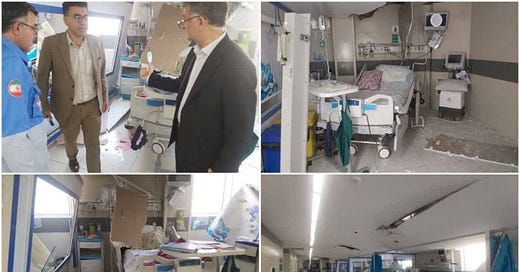Missile Strike in Kermanshah Leads to Prison Massacre as Regime Tightens Grip
June 16, 2025 — Kermanshah, Iran, A massive explosion rocked the center of Kermanshah early Monday morning after an Israeli airstrike reportedly targeted a clandestine missile depot hidden by the Islamic Republic within a densely populated area. The intensity of the blast shattered windows across the city and severely damaged Farabi Hospital, injuring civilians and overwhelming emergency services.
Collateral Damage Used as Propaganda
In the immediate aftermath, Iranian regime officials released images of the hospital damage in what appeared to be a bid to stir public outrage against Israel. Yet beneath the propaganda lay a far more harrowing truth: the explosion not only damaged medical infrastructure but also set off a deadly chain of events inside Diesel-Abad Prison.
Diesel Abad Prison: Panic, Protest, and Brutality
Terrified by the sudden blasts, inmates at Diesel-Abad Prison—located just kilometers from the explosion—panicked and reportedly attempted to flee their cells in search of safety. According to eyewitness reports and leaked internal accounts, prison guards responded with extreme force, opening fire on the unarmed prisoners. At least nine detainees were killed on the spot, and over thirty others sustained serious injuries.
Despite the gravity of the incident, no official list of victims has been released, and authorities have remained silent. Families of the dead and wounded are being denied information, while security around the prison has tightened dramatically.
This tragedy marks yet another chapter in the Khamenei regime’s ongoing war—not with foreign powers, but with its own people. As international tension escalates, the government continues to use the cover of conflict to justify its brutal crackdowns. Prisons, already brimming with political detainees and activists, have become epicenters of resistance—and, therefore, prime targets for regime violence.
The people of Iran must not let the voices of these slain prisoners be drowned out by the noise of international warfare. Their deaths are not collateral—they are the direct result of a regime that fears its own citizens more than it fears external enemies.
The missile strike also exposes a deeper, systemic abuse: the Islamic Republic’s deliberate militarization of civilian zones. For years, the regime has hidden weapons depots inside residential neighborhoods, stationed missile launchers beside schools, placed air-defense systems atop apartment buildings, and set up nuclear and intelligence offices within urban centers. These are not defensive strategies—they are cynical efforts to use civilians as human shields.
International media outlets were quick to seize on the June 16 airstrike, broadcasting only fragments of the truth—focusing on Israel’s role while omitting the crucial context: that the missile depot was deliberately hidden in a civilian area by the Islamic Republic. By reporting only on the hospital damage and echoing the regime’s claims of victimhood, these outlets reinforced Tehran’s narrative and escalating confusion and fear among ordinary Iranians. Instead of exposing the regime’s practice of endangering its own people to shield its weapons, much of the coverage lent legitimacy to its propaganda—helping the Khomeinist regime tighten its grip through the illusion of external persecution.
The international community and the people of Iran must work together to identify and expose these dangerous installations and pressure governments and human rights organizations to act. Protecting Iranian lives requires stripping the regime of its ability to hide behind them.
The Diesel-Abad massacre is not an isolated incident. Recent reports from Evin and Qezl-e-Hazar prisons indicate that the regime has further restricted inmate rights, suspended visitations, and deployed special guard units. Several new arrests have been accompanied by baseless accusations of “Israeli espionage”—a familiar tactic used by the regime to discredit dissidents and justify violent suppression.
What happened in Kermanshah is not just a local tragedy—it is a national outrage. The lives lost in Diesel-Abad, the reckless endangerment of civilians, and the propaganda machine’s exploitation of a hospital explosion must be met with a unified, nationwide protest. The only path forward is one of collective resistance. The regime has declared war on its own people; the people must respond with the demand for justice, dignity, and freedom.





